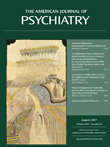Effects of Antenatal Depression and Antidepressant Treatment on Gestational Age at Birth and Risk of Preterm Birth
Abstract
Objective: The authors evaluated the effects of prenatal antidepressant exposure and maternal depression on infant gestational age at birth and risk of preterm birth. Method: Ninety women were followed in a prospective, naturalistic design through pregnancy with monthly assessments of symptoms of depression and anxiety using the Structured Clinical Interview for DSM-IV mood module for depression, the Hamilton Depression Rating Scale, the Beck Depression Inventory, and the Perceived Stress Scale. Participants included 49 women with major depressive disorder who were treated with antidepressants during pregnancy (group 1), 22 women with major depressive disorder who were either not treated with antidepressants or had limited exposure to them during pregnancy (group 2), and 19 healthy comparison subjects (group 3). The primary outcome variables were the infants’ gestational age at birth, birth weight, 1- and 5-minute Apgar scores, and admission to the special care nursery. Results: Groups 1, 2, and 3 differed significantly in gestational age at birth (38.5 weeks, 39.4 weeks, 39.7 weeks, respectively), rates of preterm birth (14.3%, 0%, 5.3%, respectively), and rates of admission to the special care nursery (21%, 9%, 0%, respectively). Birth weight and Apgar scores did not differ significantly between groups. Mild to moderate depression during pregnancy did not affect outcome measures. Conclusions: Prenatal antidepressant use was associated with lower gestational age at birth and an increased risk of preterm birth. Presence of depressive symptoms was not associated with this risk. These results suggest that medication status, rather than depression, is a predictor of gestational age at birth.



